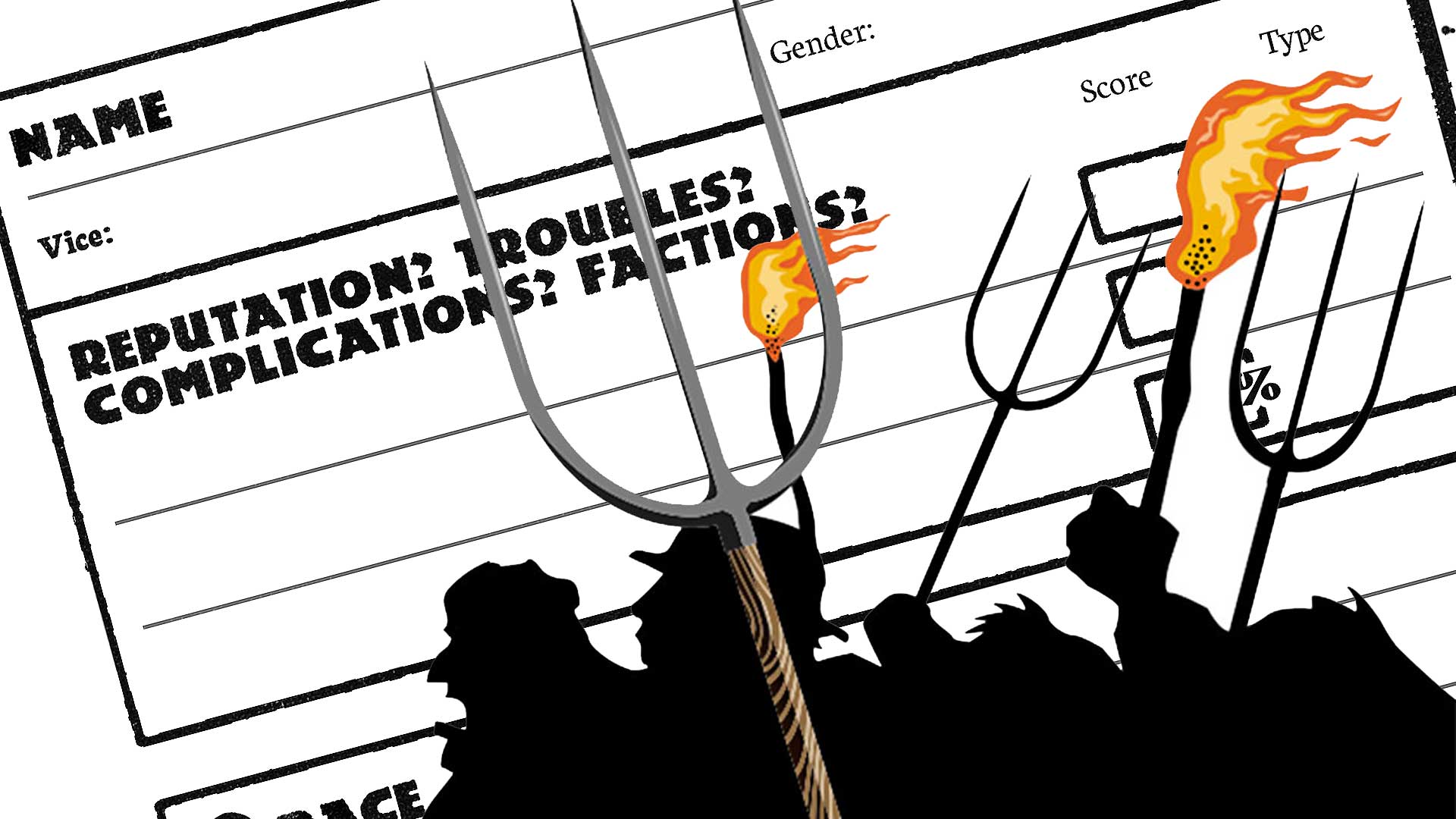In theory, I am a narrativist GM who enjoys character arcs and well-developed backstories.
In practice, I end up running gag-filled game sessions with my friends that, while not totally full of murder hobos, is more Monty Python than Lord of the Rings.
The over-the-top, tongue-in-cheek weird fantasy setting and rules of Apocalympus are a concession to that reality. These are not rules that should expect time-intensive backstories or deeply-integrated mechanics supporting narrative gameplay. But dammit, I still want something that ties in the PCs to the world.
Reference Mechanics
I’m pulling from a few different RPG rules to assemble this Frankensteined-together mechanic:
- 13th Age’s Icon Relationships: Players each select from a list of key, powerful NPCs – and their related factions. These “Icons” all have alignments, and players must select if their PC has a positive, negative, or conflicted relationship with them. At the end or beginning of a session, Players roll dice to determine if their icon relationships appear in the session to provide some benefit.
- FFG Star Wars’ Obligation and Duty (PDF): Players roll for or select from a list of narrative hooks that they must flesh out (e.g. troublesome Obligations like family or a bounty on your head – or Duties to the rebellion such as recruiting or tech procurement). Players can take additional ones for bonuses. The GM assembles the total list and rolls for it to determine whose RP hook is triggered. Immediate mechanical impacts come into play automatically.
- FATE Core’s Trouble Aspects: Another RP hook, a PC’s Trouble is a mechanical way the GM – or the Player, even – can use to add dangers or complications for their PC in exchange for metacurrency benefits. These troubles generally come in two forms: personal struggles “about your darker side or impulses that are hard to control” or “people or organizations that make your life hard.”
- Troika: This is not a matter of mechanics, but rather in tone and worldbuilding. There are not long infodumps or walls of text that Players’ eyes will glaze over. Clues and facts about the setting are littered across the Backgrounds and other descriptions. I think this approach is also great for what I’m creating in Apocalympus.
There are a lot of interesting ideas here, but also some elements from each system that don’t fit well with the fast-and-loose lightweight nature of the Apocalympus rules.
- Icon Relationships connect PCs right into the world and its power brokers without forcing a lot of worldbuilding or character development right out of the gate. This is great. However, it uses a decent number of moving parts (different Icon alignments, three different types of alignments, mechanical benefits aligning to the above). Most problematic is the eventuality of multiple Players rolling for multiple Icons to be involved in a session. That’s too much for an Apocalympus GM to have to juggle. Not that type of game.
- Obligation and Duty uses a chart of all the PC’s obligations that the GM rolls against. This lessens the potential in-session complexity, which I think is great. However, it requires at least some character development up front, which is at odds with the randomly-generated PCs and quick-starting design of these rules.
- Troubles are another variety of Aspect in FATE. I already have a version of aspects (or tags, from other rule sets) in the form of Race, Class, and Boon that I didn’t want to replicate. However, I like how FATE draws explicit attention to those problems and complications which make life “interesting” for PCs, so I want to reference this while leaving behind the onus of character development and any metacurrencies.
Faction Complications in Apocalympus
Here’s where I’ve landed so far. I need to translate these thoughts and concepts into the text of the rules, themselves, but I’m liking the idea enough to fit it into an updated character sheet.
- As rabblerousing adventurers, the PCs are connected to powerful, influential Factions which coexist in an uneasy balance. These Factions, yet to be named and detailed, are all generally self-serving cabals in various shades of gray moralities, with the exception of a small count of villainous groups.
- At character creation take fifteen percentage points and distribute them between 1-3 different Factions. It’s easier on the GM is these are in five-point increments, but this is not necessary.
- For each Faction chosen, mark if the PC has a positive or negative relationship with them. Positives may include duties, commitments, or other obligations (we interrupt your regularly scheduled adventuring to foist this macguffin upon you). Negatives may be debts, enemies, or other troubles.
- At the beginning of each session (or end of a preceding session for GMs who want more prep), assemble the the “Misery Index” of the PC’s faction complications and roll a d100. Roll again if you land on a multiple of five (e.g. 10, 35, 80, etc.). The resulting number(s) corresponds with which PC’s complication gets highlighted this session – much to their trouble and likely suffering.
So there you go. Easy to tie PCs into the world without forcing Players to commit to much character development (important for a lightweight, fun time, usually lethal set of rules as this) and provides that tie-in in a way that’s easy for GMs to manage.
Also, this fits well into the Apocalympus mechanics. There’s already a system for providing bonuses/advantages to the PCS – the Race, Class, Boon, and even Mutation aspects. This counterbalances those advantages with tools for the GM.
As PCs adventure, the minimalist character progression rules allow for reducing these numbers, so the GM can mess with them less. 😉
Labels: What Do I Call This?
Here’s where I’m stuck.
What do I call this system? Factions? Reputation? Complications? Troubles? I want to keep it short, and Faction Complications is a bit long, but maybe that’s where I settle.
Likewise, what terms do I use to describe the positive and negative types of Faction relationships? Those terms seem so bland, but Love/Hate and Duty/Debt may restrict mindsets more than I intend/

